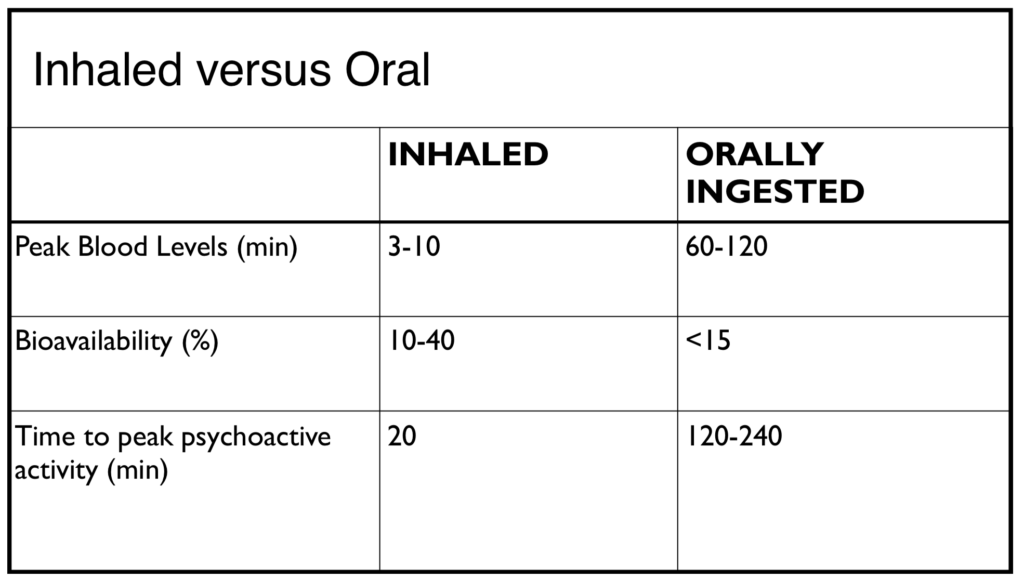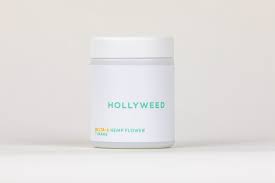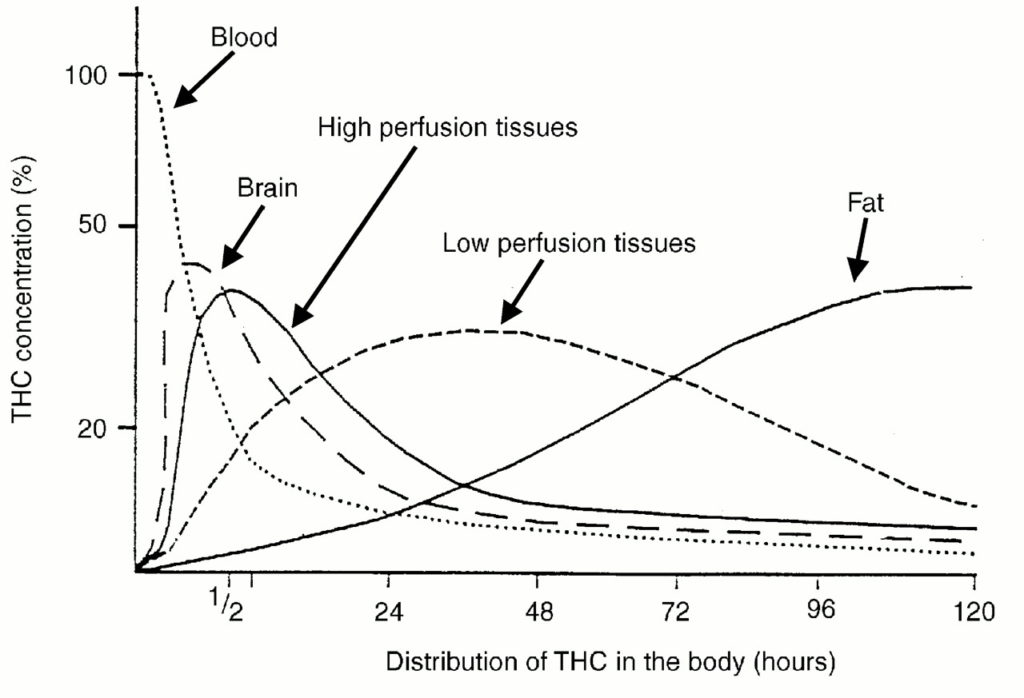Half Life of Tetrahydrocannabinol The half-life of tetrahydrocannabinol (THC) is the time it takes for the body to metabolize one-half of the THC present in your blood. The half-life can vary from two to four hours, depending on how much you smoke, your metabolism, and other factors. Tetrahydrocannabinol (THC) is one of many cannabinoids found in marijuana. Cannabinoids affect brain function by attaching themselves to receptors located on neurons. These receptors are used by naturally occurring chemical messengers called endocannabinoids. THC has a strong affinity for CB1 receptors and mimics these natural chemicals in your body.
The half life of tetrahydrocannabinol is about 24-36 hours. Tetrahydrocannabinol (THC) is the main active ingredient in marijuana. It is responsible for the “high” that people feel when they use marijuana. THC affects areas in the brain that control pleasure, memory, thinking and concentration. The liver breaks down THC into 11-hydroxy-delta-9-tetrahydrocannabinol (11-OH-THC) and other metabolites. 11-OH-THC has pharmacologic effects similar to those of THC but lasts longer and may be more potent than THC itself. THC is usually smoked or eaten because these methods allow it to enter the bloodstream quickly through the lungs or digestive tract, respectively. When inhaled or eaten, THC reaches peak levels within minutes and then takes about 1 hour to be metabolized by the body. Once ingested, THC is metabolized in the liver by cytochrome P450 enzymes CYP2C9 and CYP3A4; this process produces two different metabolites: 11-hydroxy-Δ9 -tetrahydrocannabinol (11-OH Δ9 -THC) and 11-nor -9 -carbox
The half-life of THC is the time it takes for the body to eliminate one-half of the amount of THC consumed. In other words, if you consume 20 milligrams (mg) of THC, then 50 percent will be eliminated from your system in 1.5 hours (1/2 x 60 minutes). The half-life of THC is approximately 25 minutes to 1 hour, depending on how much you smoke and your body weight. The higher your body mass index (BMI), the longer it takes for your body to eliminate THC. Some people have a high tolerance for cannabis and may not feel its effects for up to 4 or 5 hours after their last dose. This can be especially true if they are using edibles or drinking alcohol at the same time as smoking weed, which slows down their ability to process all the chemicals in their bodies at once.
What is the half-life of cannabinoids?

The half-life of cannabinoids is the time it takes for the concentration of a drug to decrease by 50%. The half-life of cannabinoids varies depending on where you are in your body and what type of cannabinoid you have. The half-life for THC is about 5 hours, which means that after 5 hours, only half of the THC will remain in your system. The other half will have been metabolized into other chemicals or excreted from your body through urine or feces. The half-life for CBD is estimated to be between 4 and 9 hours. It also depends on whether you’re using a concentrate or an isolate, as well as how much you consume.
Cannabinoids are a class of chemical compounds that activate cannabinoid receptors in the brain. The most well known cannabinoids are tetrahydrocannabinol (THC), the primary psychoactive ingredient in cannabis, and cannabidiol (CBD), which is not psychoactive but has many medical uses. The half-life of cannabinoids is the time it takes for their concentration to decrease by half in your body after you take them. The half-life of THC is estimated to be 1-4 days, while CBD’s is estimated to be 7-14 days. How long do cannabinoids stay in your system?
What is the half-life of CBD?
The half-life of CBD is around 2 months. This means that after 2 months, half of the amount of CBD will have been metabolized into other compounds. The half-life of a drug refers to the time it takes for 50% of a drug to be cleared from the body. The half-life of a drug depends on various factors including its route of administration, dose and other medications taken at the same time.
The half-life of a substance is the time it takes for half of the compound to be metabolized. For example, if you consume 100 milligrams of CBD, in 30 minutes 50 milligrams will be metabolized, and in 60 minutes 25 milligrams will be metabolized. The half-life of CBD depends on how much you consume and your genetics. If you’re consuming high doses of CBD (for example, more than 50 milligrams per day), then your body may clear out the cannabinoids faster than usual. If you have a fast metabolism and take small doses of CBD, then your body may take longer to clear out the cannabinoids in your blood stream. The half-life of CBD is not fixed and varies based on how much you’ve consumed, how fast your metabolism is, how well your body absorbs cannabinoids into its system and even which cannabinoid receptors are present in your body at any given time. A study by ElSohly et al. (1990) tested the plasma levels of THC after smoking marijuana and found that its plasma level peaked at about 1 hour post-exposure and slowly declined over 4 hours until returning to baseline levels (i.e., no detectable levels).
How long will delta 8 stay in your system for a drug test?
How long will delta 8 stay in your system for a drug test? A: Delta-8 THC is the main metabolite of THC, or tetrahydrocannabinol. THC is the active ingredient in marijuana that produces a high when smoked. The chemical structure of delta-8 THC is very similar to that of THC, so it is often detected by drug tests even though it doesn’t produce any effects. Delta-8 THC has a half-life — the amount of time it takes for half of the substance to leave your body — of about 35 hours, according to research published in the Journal of Analytical Toxicology. Alcohol also has a long half-life and can be detected in urine up to eight days after drinking stops. However, other drugs like cocaine and meth have shorter half-lives and are usually undetectable within two days after use.
If you are wondering how long delta 8 will stay in your system, the answer is that it depends on three factors: how much delta 8 you took, which test you are taking and whether or not you have been using any other drugs. Delta 8 stays in your body for much longer than THC. This means that if you take a large dose of delta 8, it can still be detected by a urine test after several days to weeks. Urine tests: Urine tests detect delta 8 in your urine up to 7-10 days after use. Because of this, it’s best to wait at least one week before testing clean if you have recently used marijuana or hash oil. Blood tests: Blood tests can detect delta 8 in your blood for up to 24 hours after use. However, because of this short detection time, most employers will only conduct blood tests for workers suspected of using marijuana while on-the-job or as part of a post-accident investigation into an accident where alcohol may have played a role.*
What is the half-life of Delta 9?

The half-life of Delta 9 is 1.5 hours. This means that after 1.5 hours, half of the Delta 9 will have broken down into 11-hydroxy-THC (11-OH-THC). After another hour, half of the remaining amount of THC will have broken down into 11-OH-THC. This process continues until nothing is left of the original dose.
The half-life of Delta 9 is approximately 4.5 days. This means that a person who takes Delta 9 has a 50% chance of being positive for THC after 4.5 days, and a 75% chance of being positive after 5.5 days. The half-life of marijuana in the body varies depending on several factors, including: Body mass Age Rate of metabolism Amount consumed Type of consumption (edible vs. smoking)
The half-life of Delta 9 THC is about 1 to 4 days. This means that after one day, half of the Delta 9 THC will have been metabolized. After two days, an additional 25% has been metabolized. After four days, 75% has been metabolized. After seven days, 88% has been metabolized and so on until there is no more Delta 9 THC in your system
How long is CBD detectable in urine?
CBD is a safe and legal compound found in cannabis. It is also known as cannabidiol, so it is sometimes referred to as CBD oil or CBD hemp oil. CBD has been shown to have many health benefits, including anti-inflammatory properties and the ability to reduce anxiety. The effects of CBD are usually felt within minutes of taking it, but since it can stay in your system for several days, you may want to avoid using it if you need to take a drug test soon afterward. How long is CBD detectable in urine? CBD can be detected in urine for up to 6 weeks after use. This is because the body metabolises THC into 11-nor-delta-9-tetrahydrocannabinol (THC-COOH), which can then be detected by a blood or urine test.
How long is CBD detectable in urine? CBD is a cannabinoid known for its therapeutic benefits. But, just like THC, it can be detected in your urine for up to 30 days after use. The detection window varies based on the frequency of use and other factors. In this article, we’ll explore the time frame of CBD in urine and why it’s important to know the length of time it stays in your system. We’ll also look at how long THC remains detectable and why that matters if you’re a cannabis consumer. Cannabidiol: How Long Is It Detectable In Urine? The amount of time cannabidiol (CBD) remains in your system depends on how frequently you consume it, how much you take and other factors like your body mass index (BMI). The average detection window is up to 30 days, though some users report being able to pass drug tests after taking CBD oil daily while others say they were still positive weeks after stopping use. It’s important to note that some people may test positive even though they don’t have any detectable amounts of THC or CBD in their systems. This happens when saliva or blood test results come back positive despite having no active cannabinoids in their bodies;
Does delta-8 leave your system faster?

I’m not sure what the answer is to your question, but it seems to me that delta-8 THC would leave your system faster than delta-9 THC. Delta-8 THC is very similar to delta-1 THC, which is the primary psychoactive component in marijuana. It’s also quite similar to CBN (cannabinol). Delta-8 THC has been shown to have pain-relieving properties and may even be a better pain reliever than delta-9 THC.[1] Delta-9 THC has been shown to be a more potent antiemetic (anti-nausea) agent than delta-8 THC.[2] That’s because cancer patients undergoing chemotherapy often experience nausea as a side effect of their treatment. The cannabinoids found in marijuana may help relieve this symptom by reducing inflammation in the gastroenteric tract and by stimulating the vagus nerve.[3] So while delta-9 THC might have some advantages over delta-8 when it comes to relieving nausea and pain, it has no advantage when it comes to leaving your system. Both should leave your system at about the same rate (within hours).
The half life of any drug is the time it takes for half of the dose to be eliminated from your body. Delta-8 THC has a shorter half life than delta-9 THC, so it will leave your system faster. The half life of delta-8 THC is 1.5 to 2 hours, while the half life of delta-9 THC is about 8 hours.
